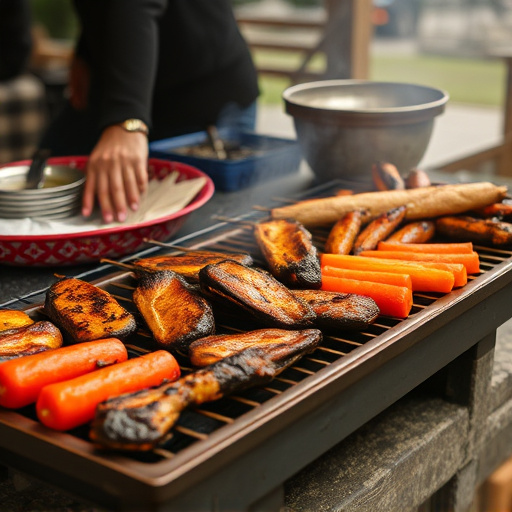Selecting the perfect BBQ ribs involves choosing between baby back or spareribs based on desired tenderness and cooking time. Prioritize fresh, meaty cuts with fat marbling. Explore St. Louis-style, baby back, or spare rib recipes, each offering distinct flavors and textures. Marinade ribs in a balanced blend of sweet, savory, and tangy spices for 4-8 hours to enhance taste and tenderness. Use brown sugar, paprika, garlic powder, salt, pepper, onion powder, and cayenne pepper for a versatile BBQ rub. Choose between wet or dry marinades based on desired texture and flavor penetration.
- Choosing the Right Ribs
- – Types of ribs: St. Louis, baby back, spare ribs
- – Selecting quality and freshness
- Marinating Magic
- – Importance of marination for flavor infusion
- – Ingredients for a classic BBQ rub
- – Wet vs dry marinades: Pros and cons
- The Marinade Recipe
Choosing the Right Ribs
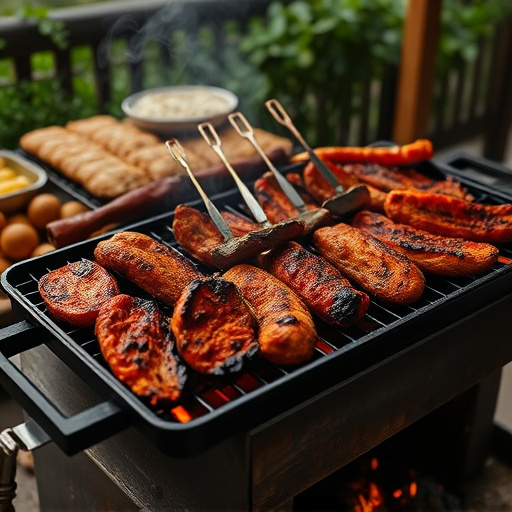
When it comes to a mouthwatering recipe for BBQ ribs, the first step begins with selecting the perfect cut. Ribs are typically categorized into two main types: baby back and spareribs. For a classic, tender, and meaty experience, opt for baby back ribs, which have less fat and are easier to grill due to their smaller bone structure. Spareribs, on the other hand, offer a more substantial bone-in option, providing an intense flavor but requiring slightly longer cooking times.
The quality of your ribs is key; look for meaty, marbled cuts with a good layer of fat, ensuring they stay juicy and tender when grilled. Consider buying from a local butcher or market to ensure freshness, as this can significantly impact the overall taste and texture of your BBQ ribs, making them truly irresistible.
– Types of ribs: St. Louis, baby back, spare ribs
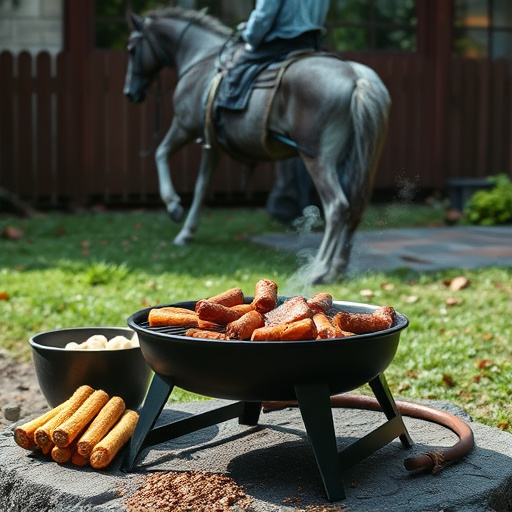
When it comes to grilling marinated ribs, there are three main types to choose from, each offering a unique flavor profile and texture. St. Louis-style ribs are known for their thin, meaty slabs with minimal bone, making them quick to cook and perfect for those who prefer a tender, flavorful bite. Baby back ribs, as the name suggests, have smaller, more compact pieces of meat attached to the bone, resulting in a juicy, succulent experience. These ribs are versatile and can be cooked to various levels of doneness, catering to different preferences.
Spare ribs, on the other hand, are larger, with plenty of meat and fat marbled between the bones. They require a longer cooking time but offer an intense, rich flavor that’s hard to beat. Whether you opt for St. Louis, baby back, or spare ribs, a well-marinated batch can elevate any outdoor gathering into a culinary event, making it a must-try for any serious grill master and a favorite among recipe for bbq ribs enthusiasts.
– Selecting quality and freshness
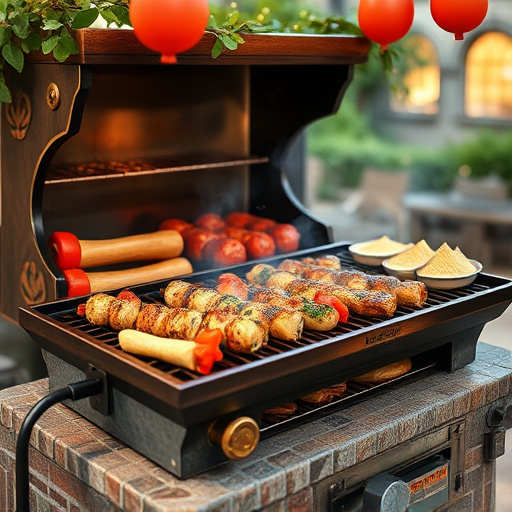
When it comes to selecting the perfect marinated ribs for grilling, quality and freshness are paramount. Look for ribs that are meaty, with a good amount of fat marbling—this ensures they’ll stay tender and juicy during the cooking process. Choose ribs from a reputable source, whether from your local butcher or a specialty market, to guarantee optimal taste and texture.
Freshness is equally important. Opt for ribs that have been properly stored and are free from any signs of spoilage. A good rule of thumb is to select ribs with a bright red color and a slightly sticky coating—indications of high quality and freshness. By prioritizing these factors, you’ll be well on your way to creating an exceptional recipe for BBQ ribs that will impress your outdoor dining guests.
Marinating Magic

Marinading your BBQ ribs is an art that can transform a simple dish into an outdoor flavor sensation. The magic lies in the combination of spices, acids, and oils that penetrate deep into the meat, enhancing its natural taste. A good marinate recipe for BBQ ribs should include ingredients like soy sauce, brown sugar, garlic, and a touch of vinegar to create a balance of sweet, savory, and tangy flavors.
This process not only adds depth but also helps to break down tough collagen in the ribs, making them tender and juicy when grilled. Whether you’re a seasoned cook or just starting out, mastering this technique can elevate your BBQ game significantly. So, don’t underestimate the power of marination – it’s a secret weapon for any recipe for BBQ ribs.
– Importance of marination for flavor infusion
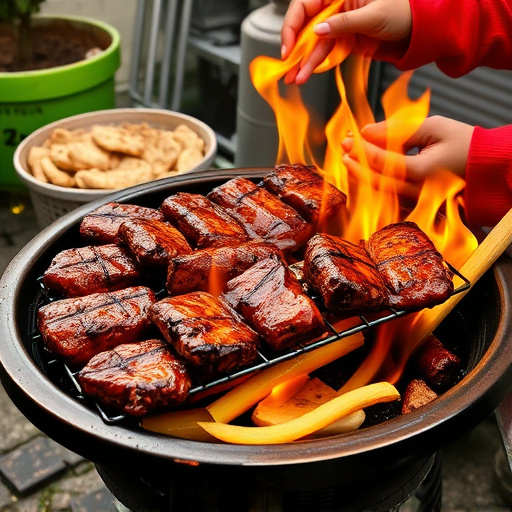
Marination is a crucial step in enhancing the flavor of your BBQ ribs, making it an integral part of any recipe for bbq ribs. By soaking the ribs in a mixture of spices, acids, and oils, the meat absorbs these flavors, creating a complex and rich taste profile that would otherwise be missing. This process also helps to break down some of the muscle fibers, making the ribs more tender and easier to chew.
Choosing the right marinade is key; a good combination should include sweet and savory elements, such as brown sugar or honey for sweetness, and soy sauce, garlic, or mustard for depth and umami. Acids like lemon juice or vinegar can also help to tenderize the meat and brighten the flavors. Once marinated, your ribs are ready to be grilled, where the heat will lock in all those delicious flavors, resulting in a mouthwatering dish that’s sure to satisfy any BBQ lover.
– Ingredients for a classic BBQ rub
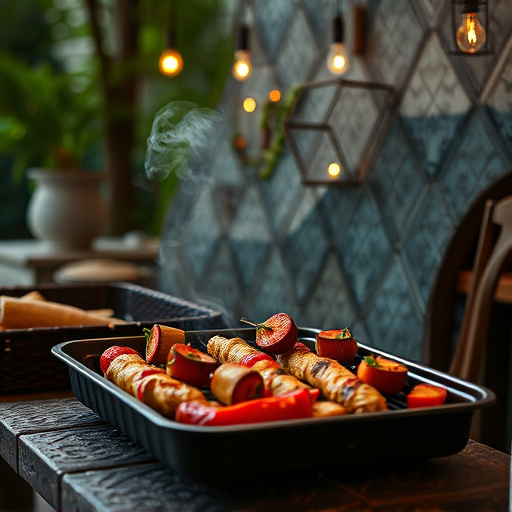
When it comes to marinating your ribs for that perfect grill session, the key lies in a classic BBQ rub. This magical blend of spices adds depth and flavor that will transform your ribs into a culinary delight. A simple yet effective recipe includes a combination of brown sugar, paprika, garlic powder, salt, pepper, onion powder, and cayenne pepper. The sweetness from brown sugar balances the heat from paprika and cayenne, creating a complex taste profile.
Each ingredient plays a crucial role in enhancing the overall flavor. Paprika imparts a smoky, slightly spicy note, while garlic powder adds a pungent aroma. Salt and pepper are essential for that savory kick, and onion powder contributes a subtle, oniony depth. This versatile rub can be adjusted to your taste preferences—less heat for the mild-loving grillers or a kick more intense for those who enjoy a fiery bite.
– Wet vs dry marinades: Pros and cons
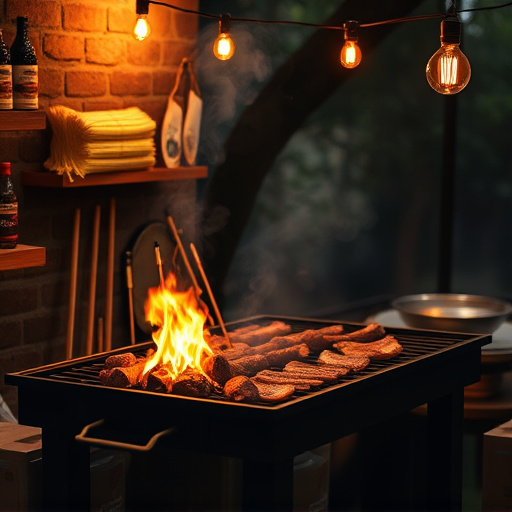
When it comes to marinating your ribs, there are two main schools of thought: wet and dry marinades. Wet marinades, as the name suggests, involve submerging your ribs in a liquid mixture that includes various spices, herbs, and often acid components like vinegar or citrus juices. The pros are numerous; the acid in these liquids can help break down tough collagen fibers, making the ribs more tender after cooking. Additionally, wet marinades infuse a rich, flavorful profile directly into the meat, offering a burst of taste with every bite. However, the downside is that the ribs may become too soft or even over-marinated, leading to a mushy texture.
On the other hand, dry marinades consist of rubbing spices and herbs directly onto the rib surface without any liquid base. This method allows for more control over the seasoning as you can adjust the amount applied. Dry rubs provide a nice crust on the ribs, adding depth and complexity to the flavor profile. They’re perfect if you prefer a slightly crispier texture with well-defined meat flavors. The challenge is that dry marinades may not penetrate as deeply into the meat as wet ones, so it’s essential to allow ample time for the ribs to absorb the spices before grilling for the best results in your recipe for BBQ ribs.
The Marinade Recipe
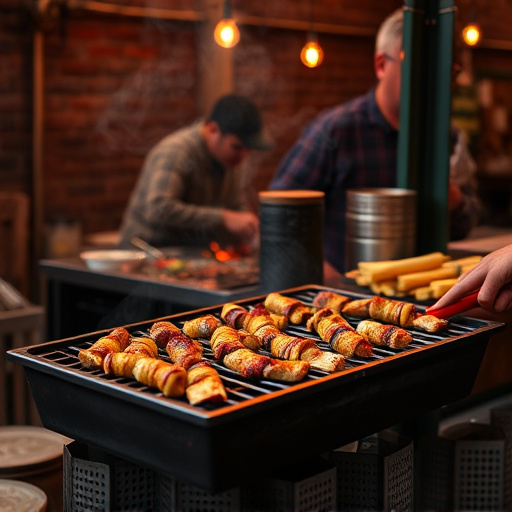
For mouthwatering outdoor flavors, a marinade is key to transforming your BBQ ribs into a true culinary delight. Start by combining 1/2 cup each of ketchup, brown sugar, and apple cider vinegar in a large bowl. Add 3 cloves of minced garlic, 1 tablespoon of dried oregano, 1 teaspoon of black pepper, and a pinch of red pepper flakes for a kick. Whisk everything together until the sugar dissolves, creating a luscious, tangy sauce that will tenderize and flavor your ribs.
Next, place your ribs in a large resealable bag, pour over the marinade, ensuring every piece is coated evenly. Seal the bag tightly and refrigerate for 4-8 hours, or preferably overnight. This step allows the flavors to penetrate deeply, making each bite of your grilled ribs an explosion of deliciousness.
